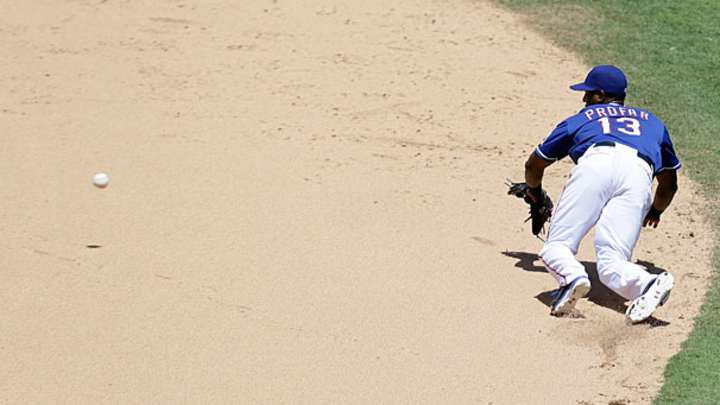Time for Jurickson Profar to show what he can do for Rangers

Jurickson Profar is an above-average defender but he doesn't have as much experience at second base as he does at shortstop. (Tony Gutierrez/AP)

The most important player in Wednesday night's $230 million Prince Fielder-Ian Kinsler trade could very likely be a 20-year-old who hit .234/.308/.336 in just 85 major league games in 2013. For Jurickson Profar, however, the time has come to prove that he is deserving of not just the hype that came with his being named the consensus top prospect in baseball prior to the season, but of an everyday job for a contending team. It was Profar's presence as the heir apparent in the Rangers' infield that made Kinsler expendable, and it is Profar's potential, as much as Fielder's, that convinced Texas to increase its financial commitments by $76 million in making the trade.
JAFFE: Why the trade makes sense for both teams
That's a lot to heap on the shoulders of a player who won't be of legal drinking age in this country until Feb. 20, but among the traits for which scouts have praised Profar is his maturity. Profar, who was signed by the Rangers out of his native Curaçao at the age of 16 in July 2009 and made his professional debut the next year in the full-season Low A Northwest League at 17, has spent his entire career playing against players significantly older than himself. At 18 he hit .286/.390/.493, stole 23 bases and walked more often than he struck out in the Sally League. His average teammate was 20. The next year, his age-19 season, he skipped over High A to hit .281/.368/.452 at Double A. His average teammate was 23. By the end of that season, he was in the majors and homered in his first at-bat.
Profar climbed the Rangers' minor league ladder so quickly that the team didn't have a place for him to play in 2013, and much of his poor performance at the plate this past season has been blamed on his lack of a defined role. Profar, who played 274 of 304 games at shortstop in the minor leagues from 2010 to 2012, started at five positions for Texas in 2013, making no less than 10 but no more than 29 starts at, in order, second base, shortstop, designated hitter and third base plus four more starts in leftfield. Initially called up to fill in for Kinsler when the later fractured a rib in mid-May, Profar started more than two consecutive games at the same position just once after Kinsler's mid-June return. That happened at the start of September, when Elvis Andrus missed five games due to a sore back, and Profar started in his place at shortstop. It doesn't seem like a coincidence that Profar had two hits in each of the last two of those five games.
It was thus imperative for the Rangers to find a permanent home for Profar, and the Kinsler-Fielder trade has done just that, parking him at second base for the forseeable future.
ROSENBERG: Tigers making another win-now move
So, what does Profar offer Texas? He is considered average or better in all facets of the game, including high marks for maturity and instincts, but not elite at any one thing. He's not a particularly fast runner, but he has sufficient speed and feel for the game to steal 20 bases a year. His power isn't fully developed, but some believe he could be a 20-homer-a-year player, as well. Considered a pitching prospect by many teams at the time of his signing, Profar has a strong arm that will be slightly wasted at second base, but should come in handy on relays and unconventional plays in the infield. His overall skill as a second baseman remains to be seen, but as an above-average shortstop he is expected to be an asset defensively.
The most compelling of Profar's skills, however, are his ability to make consistent, hard contact from both sides of the plate, hit for solid averages and get on base. He has yet to hit higher than .286 at any level, but, again, he has consistently played in leagues where the average player is two or more years older than he is. Despite that, he drew 172 unintentional walks in the minors against just 212 strikeouts, an excellent 1.23 ratio.
Since reaching voting age, Profar's minor league line has been .283/.377/.467 and if you prorate his counting stats from those seasons to 700 plate appearances you get 39 doubles, 10 triples and 17 home runs. The potential for that kind of production from an above-average defensive second baseman who switch-hits, steals 15 to 20 bases a year and plays the game with strong instincts and awareness goes a long way toward explaining why the Rangers so desperately needed to clear a position for him. Put another way, that line above works out to an .844 OPS, a mark the three-time All-Star Kinsler has surpassed just once in his eight-year career.
As he continues to mature both physically and in his baseball abilities, Profar has the potential to grow into a 20-homer player who regularly flirts with .300 batting averages. Of course, there's also the very real possibility that Profar will continue to struggle in 2014 despite his more consistent playing time and role. He will, after all, be just 21, and not every 21-year-old can be Mike Trout or Manny Machado. Still, the consensus around the game is that Profar's total package, even if it lacks a singular elite skill, is that of a similarly elite talent.
[si_video id="video_60C6F2B4-663F-B0A6-51DD-7C3568BC03E5" height="470"]
